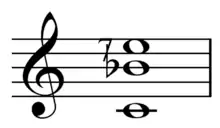
A12 triad (4:7:10) in conventional notation. ⓘ

Octave 12-tet (left) compared with tritave 12-tet (right)
A12 (ⓘ) is a non-octave-repeating scale or musical tuning featuring twelve steps to the tritave. As twelve steps to the octave is based on a triad of harmonics 4:5:6 (root, major third, perfect fifth), ⓘ A12 is based on a triad of harmonics 4:7:10 (root, harmonic seventh, and compound major third).[1] Discovered by Heinz Bohlen between 1972 and 1973,[2] it was named "A12" by Enrique Moreno.[3] Bohlen considered this scale less logically consistent than the Bohlen–Pierce scale, which has thirteen steps in the twelfth.
| Step | Ratio | Audio | Cents (just) | Audio | Cents (ET) | Difference |
|---|---|---|---|---|---|---|
| 0 | 1/1 | ⓘ | 0 | ⓘ | 0 | 0 |
| 1 | 11/10 | ⓘ | 165.00 | ⓘ | 158.50 | -6.50 |
| 2 | 6/5 | ⓘ | 315.64 | ⓘ | 316.99 | 1.35 |
| 3 | 30/23 | ⓘ | 459.99 | ⓘ | 475.49 | 15.50 |
| 4 | 10/7 | ⓘ | 617.49 | ⓘ | 633.99 | 16.50 |
| 5 | 11/7 | ⓘ | 782.49 | ⓘ | 792.48 | 9.99 |
| 6 | 7/4 | ⓘ | 968.83 | ⓘ | 950.98 | -17.85 |
| 7 | 21/11 | ⓘ | 1119.46 | ⓘ | 1109.48 | -9.99 |
| 8 | 21/10 | ⓘ | 1284.47 | ⓘ | 1267.97 | -16.50 |
| 9 | 23/10 | ⓘ | 1441.96 | ⓘ | 1426.47 | -15.49 |
| 10 | 5/2 | ⓘ | 1586.31 | ⓘ | 1584.97 | -1.35 |
| 11 | 11/4 | ⓘ | 1751.32 | ⓘ | 1743.46 | -7.86 |
| 12 | 3/1 | ⓘ | 1901.96 | ⓘ | 1901.96 | 0 |
See also
References
- ↑ "Other Unusual Scales". The Bohlen–Pierce Site. Retrieved 27 November 2012.
- ↑ Bohlen, Heinz: 13 Tonstufen in der Duodezime. Acustica, vol. 39 no. 2, S. Hirzel Verlag, Stuttgart, 1978, pp. 76 - 86. Cited in "Other Unusual Scales", The Bohlen–Pierce Site.
- ↑ Moreno, Enrique Ignacio (Dec 1995). "Embedding Equal Pitch Spaces and The Question of Expanded Chromas: An Experimental Approach". Dissertation. Stanford University: 12–22. Cited in "Other Unusual Scales", The Bohlen–Pierce Site.
This article is issued from Wikipedia. The text is licensed under Creative Commons - Attribution - Sharealike. Additional terms may apply for the media files.